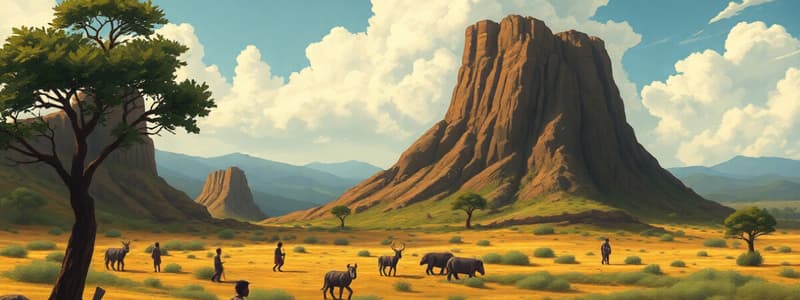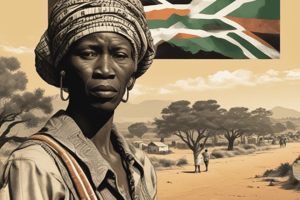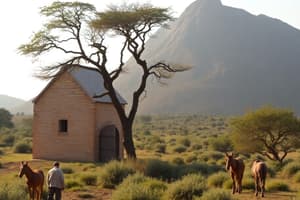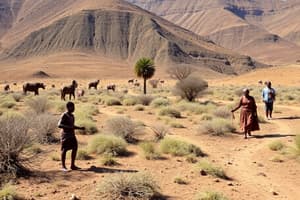Podcast
Questions and Answers
What is the significance of the term 'pariah' in the context of the quote?
What is the significance of the term 'pariah' in the context of the quote?
- It describes someone who is an outcast. (correct)
- It represents a privileged position.
- It indicates a position of strength.
- It signifies a state of being a slave.
When did the South African Native realize his condition as a pariah?
When did the South African Native realize his condition as a pariah?
- In September 1913.
- End of June 1913. (correct)
- Beginning of June 1913.
- At the time of the land act's passage.
What was one of the outcomes of the Natives' Land Act as discussed in the content?
What was one of the outcomes of the Natives' Land Act as discussed in the content?
- It empowered the natives by granting them equal land rights.
- It encouraged natives to become landowners.
- It improved the economic conditions of the natives.
- It caused many evicted tenants to move to cities and Protectorates. (correct)
Who compiled the list of people suffering from the Natives' Land Act?
Who compiled the list of people suffering from the Natives' Land Act?
What was emphasized about the relationship between man and land by Plaatje?
What was emphasized about the relationship between man and land by Plaatje?
Which newspapers provided significant information for the chapters discussed?
Which newspapers provided significant information for the chapters discussed?
What does the quotation 'man makes his own history' imply according to Marx's perspective mentioned?
What does the quotation 'man makes his own history' imply according to Marx's perspective mentioned?
What was a key theme in the discussion on the Natives’ Land Act?
What was a key theme in the discussion on the Natives’ Land Act?
What motivated the compilation of the list of sufferings from the Natives' Land Act?
What motivated the compilation of the list of sufferings from the Natives' Land Act?
What is one impact of dispossession according to the provided content?
What is one impact of dispossession according to the provided content?
What role does the sangoma play in relation to the spirits of the dead?
What role does the sangoma play in relation to the spirits of the dead?
How do white liberals perceive black individuals according to the content?
How do white liberals perceive black individuals according to the content?
What analytical tool does Mbuso theorize with the concept of the eye?
What analytical tool does Mbuso theorize with the concept of the eye?
What characteristic describes the graves identified in the context?
What characteristic describes the graves identified in the context?
What is the consequence of violence as mentioned in the content?
What is the consequence of violence as mentioned in the content?
What does dispossession primarily create according to the content?
What does dispossession primarily create according to the content?
How did the Kgobadi family's experience of land relate to their spirituality?
How did the Kgobadi family's experience of land relate to their spirituality?
How many black South Africans were identified as squatters on European-owned farms?
How many black South Africans were identified as squatters on European-owned farms?
What was one of the main restrictions placed on black South Africans regarding land ownership?
What was one of the main restrictions placed on black South Africans regarding land ownership?
What consequence does the law impose on those who trespass on land?
What consequence does the law impose on those who trespass on land?
What is meant by the 'ontological nowhere' of the farm laborer?
What is meant by the 'ontological nowhere' of the farm laborer?
Who did Parliament not have representing them?
Who did Parliament not have representing them?
What did the act state about providing accommodation to a landless native?
What did the act state about providing accommodation to a landless native?
What was a limitation placed on native land ownership in the Free State?
What was a limitation placed on native land ownership in the Free State?
What does the metaphor of the eye symbolize in the context of land ownership?
What does the metaphor of the eye symbolize in the context of land ownership?
What was the status of native locations reserved for black clans?
What was the status of native locations reserved for black clans?
What does Afrikaner nationalism refer to in the context of the content?
What does Afrikaner nationalism refer to in the context of the content?
What is indicated by the phrase 'the dead demand freedom'?
What is indicated by the phrase 'the dead demand freedom'?
What was the approximate proportion of land available for purchase by black South Africans?
What was the approximate proportion of land available for purchase by black South Africans?
What was one perceived role of General Hertzog in relation to the native population?
What was one perceived role of General Hertzog in relation to the native population?
What theme is represented through the experience of dispossession?
What theme is represented through the experience of dispossession?
What impact did the act have on squatters who relied on land for grazing?
What impact did the act have on squatters who relied on land for grazing?
Which of the following roles are mentioned as agents concerning spiritual views on land?
Which of the following roles are mentioned as agents concerning spiritual views on land?
Who did the voting rights in Union Parliament predominantly favor?
Who did the voting rights in Union Parliament predominantly favor?
What was the irony associated with the law regarding knowledge of its implementation?
What was the irony associated with the law regarding knowledge of its implementation?
What hypothesis was presented regarding the focus on the poor whites?
What hypothesis was presented regarding the focus on the poor whites?
What societal issue is highlighted through the reference to the Dutch and English distinction?
What societal issue is highlighted through the reference to the Dutch and English distinction?
What did members of Parliament lack concerning the black races?
What did members of Parliament lack concerning the black races?
Which of the following statements about renting land by natives in South Africa is true?
Which of the following statements about renting land by natives in South Africa is true?
What action did Hertzog take to influence farmers regarding natives?
What action did Hertzog take to influence farmers regarding natives?
What is emphasized about the past, present, and future concerning dispossession?
What is emphasized about the past, present, and future concerning dispossession?
What was a notable concern of Botha regarding the socio-political climate?
What was a notable concern of Botha regarding the socio-political climate?
How many whites were allocated land when the land was passed?
How many whites were allocated land when the land was passed?
What was one of the new responsibilities of the Union Parliament?
What was one of the new responsibilities of the Union Parliament?
What was a characteristic of the members of Parliament who voted for certain measures?
What was a characteristic of the members of Parliament who voted for certain measures?
Flashcards are hidden until you start studying
Study Notes
The Natives' Land Act
- The Natives’ Land Act of 1913 was a significant turning point in South African history, turning the country's native population (4.5 million black South Africans) into pariahs in their own land.
- The act drastically limited land ownership for black South Africans, effectively restricting them to small, designated areas, representing only 1/18th of the total Union land.
- The law rendered the indigenous people squatters on land owned by Europeans, making them dependent on white landowners for survival.
- The impact of the act extended beyond land ownership, creating a deep sense of dispossession and ontological nowhere.
Squatter Rights & Land Ownership
- The act made it illegal to provide landless Natives with accommodation, imposing a £100 fine or six months' imprisonment.
- While native locations were reserved for specific clans and deemed inalienable, the act stated that Natives could only buy land within these areas further marginalizing the black population.
Impact on Political Representation
- The Natives’ Land Act was passed by a Parliament representing solely white men, who had no responsibility towards the black races.
- This lack of political representation meant that the concerns and needs of the black population were not considered in the law-making process.
The "Poor White" Problem
- The Act was presented as a solution to the "poor white" problem, which was an issue of economic disparity affecting certain white communities who spoke Dutch.
- However, the focus of the act was primarily on dispossessing Black people, rather than addressing the underlying causes of poverty amongst the Dutch-speaking white population.
Afrikaner Nationalism & Dispossession
- The act contributed to the rise of Afrikaner nationalism, with General Hertzog (Minister of Native Affairs) utilizing the law to further his political agenda.
- This political strategy attempted to address the "Poor White" problem through the dispossession of Natives, consolidating white power and control.
Spiritual Impact & Eschatological Gaze
- The text highlights a spiritual dimension to Native dispossession, with land representing not just economic resource but a home, a place of belonging, and a connection to ancestors.
- The act’s devastating impact on the Natives' relationship with the land created a sense of estrangement, disrupting a deep-rooted spiritual connection and denying them the right to burial on their ancestral lands.
The Farmer’s Eye & Dispossession
- The text employs the motif of the "farmer’s eye" as a tool for analysis, highlighting the power dynamics between white farmers and Native laborers.
- The farmer’s eye represents authority and control, shaping the Natives’ reality as ontologically nowhere, stripped of their identity and agency.
- Resistance against the farmer’s control is met with violence and criminalization, reinforcing the inherent injustice of the situation.
White Liberals & Misrecognition
- The text critiques white liberals, arguing that they fail to understand the true depth of native dispossession.
- They are socialized to see black people as perpetually in need of their aid, perpetuating a paternalistic and misinformed perspective.
The Role of the Sangoma
- The text emphasizes the significance of the Sangoma (traditional healer) in Native culture, acknowledging their unique connection to the spirit world and their role in interpreting the trauma of dispossession.
- The Sangoma sees the spiritual implications of dispossession, recognizing the need to free the spirits of the dead and uphold their connection to the land.
Eschetological Gaze (Spiritual Perspective)
- The text utilizes the term "eschatological gaze" to highlight the spiritual lens through which Natives perceived their dispossession.
- This perspective integrates the past (ancestral connection to the land), the present (suffering of dispossession), and the future (hope for spiritual deliverance) into their understanding of their relationship to the land.
The Violence of Dispossession
- The act not only deprived Natives of their land but also instilled a deep-seated fear and violence.
- The text recounts the gruesome details of farm killings, highlighting the physical and psychological brutality inflicted upon Natives.
- The text concludes by highlighting the ongoing struggle for justice and recognition, emphasizing how the Natives’ Land Act continues to shape the lives of South Africans today.
Studying That Suits You
Use AI to generate personalized quizzes and flashcards to suit your learning preferences.




